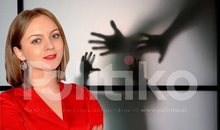
 Flash News
Flash News
Massive protests in Serbia, REL: Vučić fails to find common ground with students
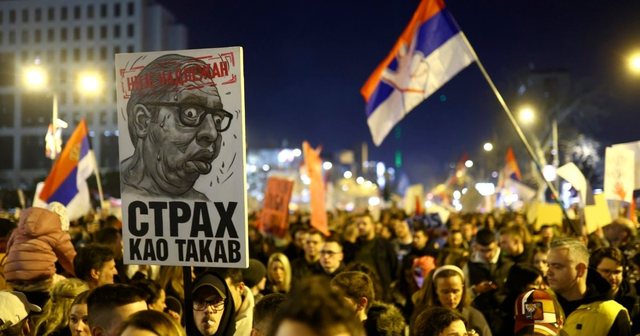
The collapse of the Serbian government under the pressure of protests, the scale of which Serbia has not seen since the regime of Slobodan Milosevic, may be the first political defeat for the country's president, Aleksandar Vučić, since he took power in 2012.
The protests are led by students. They are not demanding a change of government, but responsibility for the deaths of 15 people in the collapse of a shelter at the Novi Sad Railway Station on November 1st of last year.
At the heart of the protests are suspicions that the accident may have been caused by negligence and widespread corruption. They have now become a symbol of broader dissatisfaction with the rule of law in Serbia.
"This is not only the most serious political crisis of the government, but also a deep social crisis. The students are not asking for a change of government, but for the correction of the system. And Vučić is not able to find the key to the lock they have set," Serbian foreign policy analyst Boško Jakšić told Radio Free Europe.
When Vučić invites them to talks, the students say he is not competent. University professors, pedagogues, lawyers and farmers have also joined their demands.
Some teachers have suspended classes in schools, the Serbian Bar Association has gone on a month-long strike, farmers are "guarding" with tractors the blockades that students have made of over 60 faculties...
The students have been joined by tens of thousands of other citizens in the protests, including high school students, healthcare workers, engineers, actors, musicians, and numerous public figures.
Changes in public broadcaster reporting
Radio Television of Serbia (RTS), which has largely ignored the protests, opened its news program last weekend with the protests in Novi Sad. The reporting by the public broadcaster, which is under tight government control, was accompanied by drone footage showing tens of thousands of people protesting and blocking three bridges over the Danube River.
Vučić's Serbian Progressive Party reacted with a statement, accusing RTS of "serious abuse of the journalistic profession" and of "biasing politicians who want to destroy the constitutional order of Serbia."
The ruling party has also said that it will seek a response from the institutions responsible for financial and programming oversight of RTS.
This is not the first time that the Serbian president has criticized RTS, but the public broadcaster has, so far, followed the narrative of the authorities, whom protesters call "foreign mercenaries", "traitors" or "opposition puppets".
"Clearly, RTS has reacted to pressure from students and the general public, and perhaps this is a consequence of a different atmosphere in the entire society. The response of the authorities was such that RTS did not go any further. Something similar has happened in several previous protests ," Nikola Burazer from the non-governmental Center for Contemporary Politics in Serbia tells Radio Free Europe.
Requests for change of leadership
After several mass protests in front of the RTS building, due to the way it reports, they have been joined by several employees of the public broadcaster, demanding a change in leadership. Protests with similar demands are also being organized by several employees of Radio Television of Vojvodina (RTV).
"In the first television program, we were not able to hear the students, their demands, the citizens, the analytical stories...", Tamara Srijemac, a journalist at Radio Novi Sad, which operates within RTV, told Radio Free Europe. On February 3, while the main news edition was being broadcast, several RTV employees organized a performance outside the building, reading the "free diary".
"We wanted to show that some employees distance themselves from such editorial policies," Srijemac said.
The heads of RTS and RTV did not respond to Radio Free Europe's questions on this topic. A similar scenario followed the protests of the 1990s, when Serbia's public broadcaster was at the service of the propaganda of the Slobodan Milosevic regime.
On the eve of his downfall, which followed the war in Kosovo and NATO intervention, Serbia's current president, Vučić, was the minister of information. Vučić implemented a notorious law that was used by the then government to crack down on independent media and journalists. He has maintained control over the media even after returning to power in 2012.
The European Commission and other international organizations mention this in all annual reports on Serbia.
Failure to discredit the protests
In addition to public broadcasters, the Serbian government also controls private television stations with national coverage. Pro-government tabloids are also a powerful media weapon in efforts to discredit current and past protests.
"... but, the government, so far, has failed to achieve the effects it could have achieved earlier. Vučić, much more easily, could have discredited the opposition leaders or some other protest leaders. Now he cannot do it," says Burazer.
During his speeches, Vučić described the protests as "attempts from outside and inside to overthrow the state."
" Vučić's regime corresponds to what some authors call 'spin dictatorship', which, unlike the dictatorship of fear, is not based on violence, mass arrests, media closures, but on the manipulation of public opinion, the use of economic pressure, etc. ," says Burazer.
Although the protests have led to the resignation of the Serbian prime minister - one of Vučić's closest associates - the latter is not signaling any possible retreat. His party and its allies have a convincing majority in the Serbian parliament. He is convinced, as before, that he can secure victory in the elections again.
"The resignation [of the prime minister] is part of a calculated strategy to shift this entire crisis to the political plane and, if possible, to get out of this crisis through elections. The students have continued their protests despite the resignation. So, at present, it seems that this maneuver has not worked," Burazer assesses.
The opposition rejects the elections due to what it says are unequal conditions, which have also been highlighted by the Organization for Security and Cooperation in Europe (OSCE) mission. According to them, this includes pressure on voters, vote buying, biased media reporting in favor of the government, and misuse of public resources.
How does the international community react?
Although he accuses "Western services" of interference, Vučić is facing no clear reaction from the international community over the events in Serbia. The European Union has not yet clarified whether it supports the protesters' demands.
On February 4, Vučić's office announced that he had spoken by phone with European Commission President Ursula von der Leyen. The statement did not mention the protests, but said that they discussed "the European path and the reform processes that Serbia is implementing."
Brussels has not yet made any statement on the details of the talks. The reason for the European Union's silence, according to foreign policy analyst Boško Jakšić, is the expectation that the Serbian president will resolve the issue of relations with Kosovo.
"But, if such a policy of tolerance continues, the European Union will be solely to blame for the decline in the popularity of the EU idea and values among the Serbian public," Jakšić emphasizes.
Russia, on the other hand, has given full support to Vučić, even endorsing his messages that Serbia is the victim of a Western conspiracy and that foreign intelligence services are financing the protests.
The first reaction from the new US administration came from President Donald Trump's envoy for special missions, Richard Grenell, to whom Vučić awarded a medal in 2023 for "outstanding merits in the development of friendly relations". Grenell shared a video of the student protests on the X network on January 26 and wrote, among other things, that "there is no support for those who undermine the rule of law and forcibly occupy state institutions".
There have been no incidents or violence in the mass protests organized by students in Serbia. Student guards, rather than police, are taking care of security. World media, such as The New York Times, describe them as “the biggest explosion of discontent since the demonstrations against the Milosevic regime in the 1990s.”/REL
Latest news



Fiscal peace, but at a cost
2025-07-05 18:00:10
'Bankers' tax evasion, Chinese CEO and former director jailed
2025-07-05 17:39:21
Kyle Walker joins English club on two-year deal
2025-07-05 17:20:24
Two cars collide on the Saranda-Delvina axis, 4 injured
2025-07-05 17:05:29
Touching gesture! Liverpool will pay Jota's family's salary until 2027
2025-07-05 16:45:18
The zodiac signs that cheat most often
2025-07-05 16:25:53

"I asked for the dismissals", Dredha tries to soften Rama's 'blow' in Vlora
2025-07-05 15:48:49
Bomb threat in Parliament, prosecutor: It was a lie
2025-07-05 15:22:28

Bardhi: The recount revealed how greedy Zeqine Balluku is in stealing
2025-07-05 14:44:29
Knife wound on the secondary road Tirana-Durrës, perpetrator sought
2025-07-05 14:37:54
Tears and pain, Diogo Jota is escorted to his final home
2025-07-05 14:21:34
Success starts with yourself! Simple ways to invest in personal development
2025-07-05 13:58:50
Unlicensed firearms found in apartment, 50-year-old arrested in Lushnje
2025-07-05 13:43:11

Tirana Court remands Skerdi Sina to prison
2025-07-05 12:59:34
Cocaine laboratory in Greece, here are the Albanians arrested and wanted
2025-07-05 12:40:16
Directed Justice/Vangjeli: SPAK does not investigate any scandal involving Rama
2025-07-05 12:22:03

Bomb alert, Police remove MPs and media from Kosovo Parliament building
2025-07-05 11:48:16
"The will of the people" and the irony of ordered resignations
2025-07-05 11:32:05
Summer drowning risk: How to enjoy the water without risking your life
2025-07-05 11:20:27
Fire situation in the country, 16 fires reported in 24 hours, 4 still active
2025-07-05 11:07:04
Car hits pedestrian at white lines, injured in serious condition in Vlora
2025-07-05 10:59:58
Mosquito-borne diseases are a growing problem in Europe
2025-07-05 10:44:13



One of Sweden's most dangerous and wanted criminals arrested in Turkey
2025-07-05 09:38:29
Foreign exchange/ How much foreign currencies are bought and sold today
2025-07-05 09:18:38

"Don't be influenced by the opinions of others", today's horoscope
2025-07-05 08:40:50

Morning Post/ In 2 lines: What mattered yesterday in Albania
2025-07-05 08:02:07

Trump says he's ready to raise tariffs to 70% on some countries
2025-07-04 22:35:52
Tre shenjat e zodiakut që do ‘pasurohen’ në Korrik
2025-07-04 22:05:09
Gaza War: Hamas Accepts US Proposal for 60-Day Ceasefire
2025-07-04 21:50:10
Autocracy in Albania, Fuga: Governance has gotten out of control
2025-07-04 21:40:51
Meta: Agriculture on credit, the new fraud!
2025-07-04 21:26:39




Vote recount in Durrës ends without changes
2025-07-04 20:12:54
Gas station explodes in Rome, 25 injured (VIDEO)
2025-07-04 20:00:20

These afternoon habits often sabotage weight loss
2025-07-04 19:39:28
Former Arsenal player Thomas Partey accused of rape
2025-07-04 19:24:21
Shepherd disappears without a trace in Delvina
2025-07-04 19:14:31

Bardho gave Zegjine's mandate/Braho: Unfair! It violates the electoral system
2025-07-04 19:01:08


Rapid developments in the Sultanates!
2025-07-04 18:00:06



Italy tightens rules for skateboard traffic
2025-07-04 17:20:18

Unusual for the time, dense fog covers the coast of Vlora
2025-07-04 16:48:01


Accident on the Shkodra-Lezhë axis, one dead and 3 injured
2025-07-04 16:14:19
Albania with fewer requests for asylum and Albanian citizenship in 2024
2025-07-04 16:06:57

Albania last for quality of life, DP: Technical government is the solution!
2025-07-04 15:42:30
Nico Williams says "No" to Barcelona, signs with Athletic Club until 2035
2025-07-04 15:33:35
Fires in the country, four fires are still active, what is the situation?
2025-07-04 15:24:20

Summer brings big changes for these 4 zodiac signs
2025-07-04 15:00:04
Osmani: MPs need to agree to a secret ballot for the Speaker of Parliament
2025-07-04 14:51:09
Serious accident on the Peqin-Elbasan axis, two injured
2025-07-04 14:37:56

GJKKO leaves in force the security measure for the head of the KPP
2025-07-04 13:58:17
Who will replace Ilir Meta and take over the leadership of the PL?
2025-07-04 13:50:36
Berisha: Dismissal of directors in Vlora, another act of 'scapegoats'
2025-07-04 13:41:46




Librazhd/ In a serious psychological state, the young man consumes pesticides
2025-07-04 13:05:07


Weapons trafficked from Kosovo to Albania, two arrested, 8 pistols seized
2025-07-04 12:33:28
Konsumimi i tepërt i çokollatës, ja cilat janë dëmet që shkakton në organizëm
2025-07-04 12:23:35

Fires in the country, 21 fires in the last 24 hours, 4 still active
2025-07-04 12:00:19
WB calls for debt transparency: Albania to publish details of every loan
2025-07-04 11:50:05
Changes in the State Police, new names expected to lead 5 police stations
2025-07-04 11:40:06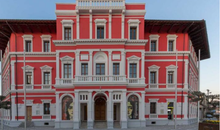
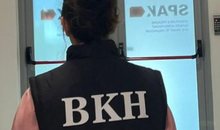
The race for the head of the BKH, the third phase on July 11
2025-07-04 11:20:23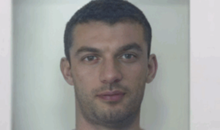
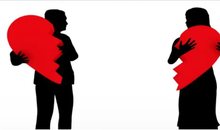
Toxic phrases that show your relationship is in trouble
2025-07-04 11:00:10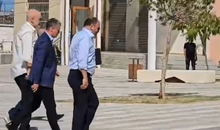

2 brothers arrested in Roskovec, cultivating narcotic plants
2025-07-04 10:38:08